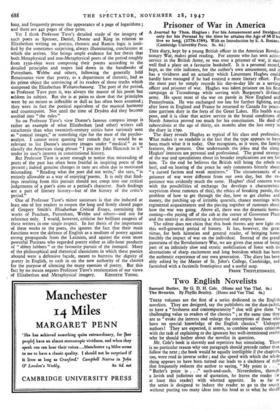Prisoner of War in America
A Journal by Thos. Hughes : For his Amusement and Designed only for his Perusal by the time he attains the Age of 50 if he live so long. (1778-1789). With an Introduction by E. A. Benians. (Cambridge University Press. 8s. 6d.)
THIS diary, kept by a young British officer in the American Revolu- tionary War, makes good reading. For anyone who has seen active service in the British Army, or was ever a prisoner of war, it may well find a place on a favourite bookshelf. It is a personal record, kept, as the title indicates, for the author's own amusement, and it has a vividness and an actuality which Lieutenant Hughes could hardly have managed if he had essayed a more literary effort. For the most part he simply records his day-to-day life as a serving officer and prisoner of war. Hughes was taken prisoner on his first campaign at Ticonderoga while serving with Burgoyne's ill-fated army. He spent most of the war on parole in New England and Pennsylvania. He was exchanged too late for further fighting, and after leave in England and France he returned to Canada for peace- time garrison duty in the forts of the Great Lakes. His health was poor, and it is clear that active service in the brutal conditions of North America proved too much for his constitution. He died of tuberculosis at the age of thirty, six months after the last entry in the diary in 179o.
The diary reveals Hughes as typical of his class and profession. What makes it so readable is the fact that the type appears to have been much what it is today. One recognises, as it were, the family features, the gestures. One understands the jokes and the slang. Hughes' interests are personal and professional. The grand strategy of the war and speculations about its broader implications are not for him. To the end he believes the British will bring the rebels to heel, and on hearing of the peace he only comments bitterly about "a cursed faction and weak ministers." The circumstances of a prisoner of war were different from our own day, but the ex- perience was evidently much the same. Hughes' chief concern was with the possibilities of exchange (he develops a characteristic scepticism about rumours of this), the ethics of breaking parole, the problem of how to get through the day, how to get clothes and money, the patching up of irritable quarrels, chance meetings with regimental acquaintances and the piecing together of rumours about how the war was going. Above all, there was the dramatic home- coming—the paying off of the cab at the corner of Grosvenor Place and the anxiety at discovering a shuttered and empty house.
The editor does not claim that this book throws any new light on this well-garnered period of history. It has, however, the great virtue, for both historian and general reader, of bringing home forcibly the impact of war on the individual. Instead of the grand panorama of the Revolutionary War, we are given that sense of being part of an infinitely slow and erratic mobilisation of force with its alternations of sharp excitement and long boredom which has been the authentic experience of our own generation. The diary has been ably edited by the Master of St. John's College, Cambridge, and furnished with a facsimile frontispiece and a useful map.
FRANK THISTLETHWAITE.




























 Previous page
Previous page